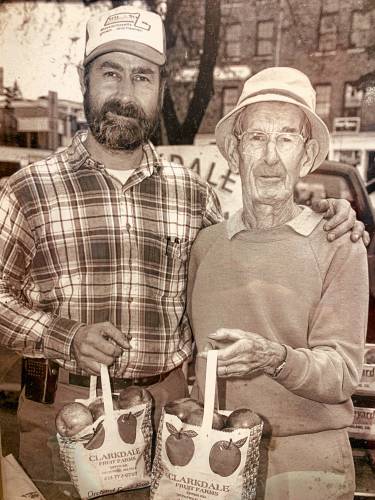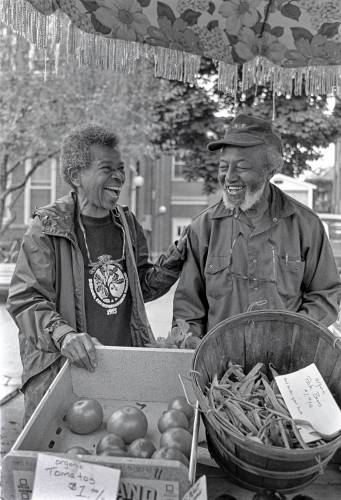Grown by the whole community: History and roots of the Greenfield Farmers Market, now in its 50th year
| Published: 05-28-2024 9:16 AM |
The people who started the Greenfield Farmers Market — with iconic local surnames like Kretzinger, Clark and Nelson — might not have imagined a 50th season, nor that it would blossom into a thriving three-season spot in Greenfield’s center where people gather on Saturdays to purchase a wide range of offerings, hear live music, and revel in a festive atmosphere.
Suzanne Kretzinger of Hunting Hills in Montague recalls meetings in her family’s kitchen; her parents, the late Anne and Melvin Kretzinger, “welcomed a diverse group of individuals discussing attempts at agricultural collaborations. This was at the very beginning of the farmers market movement,” she said. “Some cities had such markets, but there was nothing like that here.”
Melvin Kretzinger, a third-generation farmer from upstate New York, was superintendent of a nursery company near New Haven. “After (the project to build) Interstate 91 took that land by eminent domain, my parents looked for land elsewhere,” said Kretzinger. “We came to Montague in 1964. I was young, but grew up fast. Farm-educated children learn common sense and the ethic of doing a task right the first time, so you don’t have to do it over again later.”
The Kretzingers raised vegetables to tide themselves over until the nursery became productive. “My parents were very involved with public service,” said Kretzinger. “The idea came up about starting a farmers’ market for direct sales. They saw a chance to create something that could thrive.”
The Market started out on Hope Street in the parking lot behind the 1930s-era courthouse, which in 2017 was replaced by the Franklin County Justice Center. “Greenfield was the first [regional farmers market],” said Kretzinger. “Now there are many.” She pays tribute to those who started the Market, including Wally and Juanita Nelson, Fred Clark, and Jay Lord. Others involved early on included Rich Pascale, and Elaine Morley and Peter Cevasco. “Fred Clark was a cornerstone, though,” said Kretzinger. “He was always very sweet and welcoming.”
Fred Clark — grandfather of Ben, Deerfield’sClarkdale Farm’s current proprietor, and father of Tom, now officially retired, but still involved with the farm — was the son of Dr. Webster K. Clark, who started the family’s orchard business in 1915. At the outset, Fred and Tom sold at the new farmers market, but later, in the 1980s, young Ben went along with his granddad. “Some of my clearest memories about spending time with my grandfather involve the Market,” said Ben Clark. “I was allowed to handle $1 or $5 bills,” Clark said, “but anything bigger, I had to hand over to my grandfather. He was a very thrifty guy.”
As a teen, Ben did the Market on his own, and Clarkdale was involved continuously throughout its operation, until just last year. They now sell mostly at their Deerfield store, but the Clarks cherish market memories. Now 46, Ben said, “I got to know customers and other growers; it was a real education.” Ben served as Market Steering Committee member, chair, and treasurer. “We created a more formal structure, and I credit (former market manager) Devon Whitney-Deal for helping to make that happen, ensuring more financial stability.”
Tom Clark, 76, answered the phone in 1974 and heard the voice of Jay Lord, of Greenfield’s Fiddlehead Farm, asking whether the Clarks would like to help start a farmers market. Tom also fondly recalls a 1995 celebration when vendors and customers gathered to share a meal, socialize, and enjoy live music and dancing led by the famed king of contradance, the late David Kaynor of Montague. “At the end of a season, we celebrated that we made it through another year.”
Article continues after...
Yesterday's Most Read Articles
Jay Lord started out selling organic vegetables; he later built a commercial kitchen for baking bread and making butter pickles. “We baked all day on Fridays and sold on Saturdays,” said Lord. “Business was good.” Lord participated in the Market until 1983, “when The Center School took over my life.”
Tom Clark remarked that the Market was a social leveler. “People might be surprised to know that my dad, a Republican who voted for Nixon, was good friends with Wally Nelson, known for leaning in a very different direction.” Tom’s remark reminded me of a 1999 incident I witnessed at the Market during an era when I worked with Wally and Juanita Nelson at The Bean Patch, their small farm in Deerfield, and helped them at the Market weekly.
Around noon on an intensely hot day, Wally Nelson, then 90, fainted and lapsed into convulsions. An ambulance arrived, and the Market concluded on a somber note, with vendors and customers alike expressing concern for Wally. A couple of weeks later, Wally had recovered sufficiently to return to the Market. An older fellow — a weekly Market customer — approached and stood uneasily before Wally. In a halting tone, the man said: “I saw you got put in an ambulance. I thought maybe I’d never see you again.” After a pause, he continued: “Over the years, I tried to hate you, because I disagree with so much of what you stand for. But you made it impossible for me to hate you. Every week you see me, you smile and call me ‘Friend.’ So, anyway, I’m glad you’re OK.”
Wally shook the fellow’s hand, and held it for a moment. “Thank you, friend,” said Wally, beaming his winsome smile. That’s the sort of thing that can happen when community members meet in a beautiful, neutral space to support farmers, buy good food, and get to know each other.
When Wally and Juanita Nelson moved from New Mexico to Deerfield in 1974, they were surprised to find that our agricultural area did not have a farmers market; they had learned of the concept while exploring life as farmers during a brief stint in the southwest, and were sold on the idea that farmers could do direct sales in an atmosphere of collegiality and community support.
Neither Wally nor Juanita had planned to become farmers. Juanita was city girl from Cleveland, where her parents moved from Georgia during what became known as the Great Migration of African-American citizens heading north in the hopes of escaping southern racism and poverty. History shows that the Great Migration resulted in a wide range of outcomes, from utterly disappointing to glowingly successful; Juanita’s family was somewhere in between.
Wally was the 11th of 12 children in a sharecropping family outside of Little Rock, Arkansas. By age 6, he recognized that his family’s lot was akin to actual slavery, and was determined to leave that life behind. He eventually found work as a traveling salesman and took pride in performing his job while wearing a suit, shiny shoes, and a dapper hat.
Juanita told Wally around 1970 that becoming more self-sufficient by taking up farming was the only way she could think of to maximally disengage from the U.S. economy’s entanglements with militarism. She suggested that — to put their deeply held pacifist beliefs into practice — they should work the land, despite ancestral trauma related to slavery. Wally balked, but later said: “As usual, Nita was right. I followed her lead, and I’m glad I did.” As they started meeting fellow farmers in their adopted region, the Nelsons began pitching the concept of launching a farmers market in or around Greenfield.
Rich Pascale of Shoestring Farm in Colrain has lent his magic touch to the art of organic farming for over 50 years. Pascale got in on the Greenfield Farmers Market within the first year or so, and was an active participant for 45 years. These days, Pascale grows for wholesale markets, but has retired from retail sales. “I’m one of the few left from the early days,” said Pascale. “We were hardworking, and did all we could to make the Market a success.”
Marilyn Lively of Sunrise Farms Maple in Colrain has done the Market for 40 years. “My husband, Rockwell (“Rocky”) is from here, but we married and lived for a time in my native Kansas,” said Lively. “We moved here in 1983 and started sugaring the next year. By 1985, we were going to the Market.” She recalls when the Market moved from Hope Street to the parking lot of a then-bank at the corner of Main and Conway Streets.
For the last 20 years, Lively’s son Erik has joined his mom in selling their maple products and grass-fed beef at the Market; throughout her four decades, Marilyn has remained devoted to the project. She was longtime treasurer, and for some years had the distinction of being the one holding the key to the public bathroom. “That was tricky,” she said, adding, “I’m relieved that Erik has taken over in terms of leadership roles.” The mother of three and grandmother of six continues to work her other job as an educational support professional at Mohawk Trail Regional School in Shelburne, a post she’s held since 1991. Like many agriculturalists, Lively toils on the farm while pursuing a second profession in order to make it all work.
“Farming has always been hard,” said Lively, “but it’s worth it. But now, it seems every year is a mystery. Each season, we wonder what will happen over the winter, and how it will go with the crops.”
The Market would evaporate without loyal customers. On a recent Saturday, Beth Weissman of Colrain, who has shopped at the Market for decades, showed up with three generations of Weissmans: daughter Marika, 39, and grandchildren Skylar, 18, Ivy, 9, and Avery, 2. “We get to see people we’d otherwise never see,” said Weissman, a nurse manager at Baystate’s wound center.
Some locals remember literally growing up at the Farmers Market. Maisie Sibbison-Alves, now 38, recalled: “When I was six, I made fresh-squeezed lemonade and sold it at the Farmers Market every week, all summer. It was wonderful that (the organizers) let me do that,” she said. Now a shiatsu practitioner and artist, Sibbison-Alves gained skills and learned life lessons while surrounded by members of her community. Doubtless, there are many such stories from the Market’s half-century, with many more to come as it continues to thrive.
Eveline MacDougall is the author of “Fiery Hope,” and a musician, artist and mom. To contact: eveline@amandlachorus.org or PO Box 223, Greenfield MA 01302.








 Putting the students front and center: What can education can look like without high stakes testing?
Putting the students front and center: What can education can look like without high stakes testing? Sounds Local: He’ll play anything you want: Stephen Kellogg will perform an all-request show at Shea Theater, Dec. 19
Sounds Local: He’ll play anything you want: Stephen Kellogg will perform an all-request show at Shea Theater, Dec. 19 Speaking of Nature: Introducing the Birch Perch II: Making improvements to my bird observation venue
Speaking of Nature: Introducing the Birch Perch II: Making improvements to my bird observation venue Conversations over candy-making: Sharing beloved holiday food traditions
Conversations over candy-making: Sharing beloved holiday food traditions
